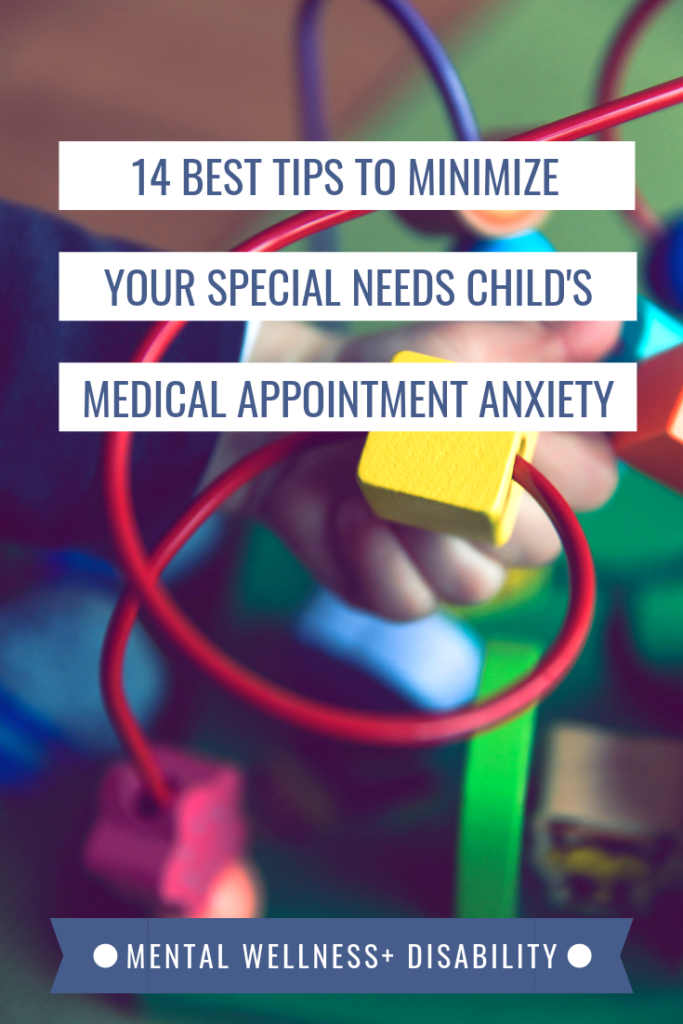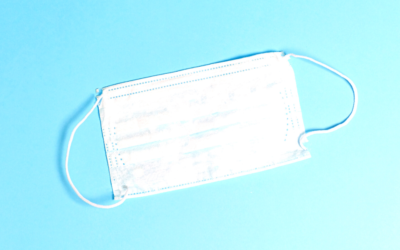One of the common issues that I talk about with special needs parents in counseling is helping their children with disabilities overcome tough emotions. Anxiety at the Doctor’s office is high on the list of emotions that are tough for parents to help their kids through. A child who is anxious on a medical appointment may meltdown, drop and flop, bolt, or become aggressive.
How do I know this?
Before becoming a therapist, I was a case manager for people with disabilities. I estimate that I attended at least 1,500 medical appointments in the 10 years I spent as a case manager.
While many were routine and unremarkable, there are certainly some that remain locked in my memory. These were the appointments which became stressful and even physically unsafe for those involved. Sometimes this was because of poor planning on my part. Other times it was due to inappropriate bedside manner by the physician. I’ve lost count of how many times I’ve seen doctors or nurses hit, bitten, or kicked by a client who felt mistreated or anxious.
More commonly though, it was my clients who suffered. Usually this manifested as extreme anxiety, sometimes reaching the point of self-injury. This anxiety was usually due to being kept waiting, or being confused or agitated during the appointment.
Over the years I developed a number of habits that helped to minimize the potential for medical appointment stress and anxiety due to waiting, confusion, and physical discomfort.

14 best tips for minimizing medical appointment anxiety for your special needs child
- Fill out all paperwork ahead of time. If you can, use an online patient portal to do this days prior to your appointment. If you can’t, call to request that the office email or fax you any forms to complete prior to the appointment. This will prevent unnecessary waiting while you finish forms, and allow you to focus exclusively on your child.
- Schedule smart. Ask for the first appointment of the day or the first appointment after the office has closed for lunch. Make sure that the office understands that it will be in everyone’s best interest for them to see your child as soon as possible upon arrival. While this can minimize your waiting time, I still recommend that you call about 15 minutes ahead of your appointment to ensure that they can see your child exactly at the appointment time. If they can’t, strategize with the office staff for what your new arrival time should be, based on if they’re backed up.What can you do if the front desk staff says that the doctor doesn’t do early morning physical appointments, but you know that your child will have MUCH more tolerance for a physical first thing in the morning? You can say:
Thanks for letting me know that, but I’d like to talk directly to my son’s doctor (or the doctor’s nurse) to confirm this. Can you please put me through to them?Don’t be afraid to push back on office policy. Ask if the office can make an accommodation (be sure to say accommodation, not exception!) given your child’s unique needs.
- Stay ahead of scheduling. Ideally, you wouldn’t leave one appointment without having the next appointment scheduled. If that’s not possible, confirm when the schedule will be open for that period of time. Anything that you can do to ensure that your child is seen at the most ideal time with the least likelihood of backup or waiting is well worth it.
- Request a double block appointment. I get that that seems counter intuitive. We’re talking about minimizing anxiety from waiting and spending time in the doctor’s office. How could a longer appointment help?
A longer appointment can have many benefits:
- The doctor gets to know your child better, but your child doesn’t have to go to the doctor as often
- You have time you to clarify what’s working and what’s not
- You have more time to get answers to your questions
Many times, doctors can add a note to a patient’s chart so that they are always scheduled for double time; just ask your doctor if they agree that this would be appropriate for your child.
- Go directly to the exam room. Minimizing transitions is often helpful in times of heightened anxiety. Even if going from the waiting room to the exam room doesn’t have a noticeable impact on your child, I still recommend that you ask to go directly to the exam room. Ask for the scheduler to note your child’s chart so that this happens automatically at each visit.
- Double up on procedures. We are fortunate in Cary, NC to have access to both Duke and UNC and their phenomenal, integrated care teams. As one example of how this benefits patients who have medical appointment anxiety, Doctors will often collaborate so that a patient sits for one blood draw, rather than going to the lab each time they see a specialist or their primary care physician. Enough vials of blood are drawn at one lab appointment so that each specialist has a sample to check. This gets used for their primary care physician to check cholesterol level, their neurologist to monitor AED levels, and their endocrinologist to check thyroid levels. Coordinating care between specialists in this way can reduce the frequency of ‘check-in’ appointments required with specialists.
- Be sure the physician and their staff understand your child’s abilities and needs. This used to be easier in the days of paper charting. Back then you could come prepared with a brightly colored sheet with a list of your child’s needs/fears/phobias. But even in this era of electronical medical records, there is usual some cloud based equivalent of a brightly colored sticky note. In any case, this should be completely unique to your child. It’s not sufficient to say “Hudson has Autism”. Instead, you should say “Hudson does not like being touched. Please do not touch him unless you must, and please tell him where you are about to touch him before you do. Confirm that he heard and understood by asking him to explain back to you what you’re about to do.”
- Have ‘pop in’ visits between routine appointments. This is tremendously helpful for reducing anxiety. It increases your child’s familiarity with the doctor’s office, and also helps to prevent them from associating the office with waiting and pain. In the ideal scenario, you’ll coordinate with the front desk staff to:
- stop by the office at an appointed time
- be weighed/have vitals taken
- go to an exam room
- have a very brief chat with a nurse
- get a treat. This could be one that the office gives out like a sticker or lollipop. Or it could be something that you’ve brought from home: Lego minifigure, small board book, container of smart putty, etc.
Even if the office staff aren’t able to offer you all of this, you can still stop informally. Sit in the waiting room and do a preferred activity with your child. You might read a favorite book, play with a slinky, or eat a small treat. This can improve the associations that your child has with the doctor’s office and increases their ability to tolerate being there. Both of these are helpful for minimizing anxiety. Schedule out pop-in visits so that you always know when the next 2-3 visits will be. Then even if you miss one, you can be confident that this important anxiety-minimizing tool won’t fall off your calendar.
- Discuss with the staff the language they will use. Many nurses and other health care workers have specific language they may use with young patients. For instance, they might say that a blood pressure cuff is going to give the child a ‘hug’. Discuss with the office staff ahead of time what language the staff will use to describe certain procedures. Be sure to use these details in your child’s ‘going to the doctor’ social story if they have one.
During this same conversation, discuss with the staff helpful things that they should know about communicating with your child. For example, many phlebotomists will joke about being a vampire prior to drawing blood. I’ve known many clients who didn’t understand that this was a joke. They were even more uneasy during blood draws than they would have otherwise been! Be sure to let the staff know of any recommendations that you have. Remember, you are not wasting their time having these conversations ahead of time; you are in fact setting them up to have the best rapport with their patient. They will appreciate your guidance!
- Bring diversions. This might be an iPad, coloring or writing activities, and favorite stuffed animals. Don’t forget chargers, headphones, pencil sharpeners, etc.!
- Bring a worst-case scenario bag. I’m a big advocate for considering the worst-case possibilities and then planning and packing for them. What if your child gets anxious and spills water on themselves or has a bathroom accident? What if the doctor’s office is colder or hotter than anticipated and they’re uncomfortable in the clothes they’re wearing?
I recommend keeping an ‘appointment bag’ fully stocked at all times with a change of clothes, snacks, chargers, etc. This means committing to NOT break into the bag except for in use during an appointment. When I was a case manager and frequently on-call, I actually kept one of these stocked in the trunk of my car. I cannot tell you how grateful my clients and I were for this pre-planning on so many long nights in the Emergency Department; we had coins for vending machines, bottles of water, warm socks, word puzzle books, phone chargers, etc.
As part of this, I suggest you consider your child’s potential behavioral response to a worst-case scenario. If your child may become aggressive, discuss with their physician if they can have a PRN medication for agitation. You can always choose not to use it, but at least you’ll have it available for high-anxiety provoking medical appointments. If they’re prone to biting when stressed, have some bite jewelry or other safe option at the ready.
- Use a coping skills kit. Medical appointments can be a great time to use of a coping skills kit. Check out this post, where I outline how to make this a functional stress reduction technique for your child.
- Bring someone along. Maybe a family member. Perhaps a babysitter or even a hired case manager or personal care aide. Maybe a professional organizer. Think about the worst medical appointment you ever had with your child, and what would have made it better. Someone who knew your child who could entertain them while you spoke with the doctor? A person to advocate for your child and ask medically-minded questions? Someone to help you develop a system to keep track of all of the new prescriptions and recommendations? Consider what you’ve needed most in the past, and identify who can fill that role at future appointments.
- If you must travel, consider hominess and continuity. Sometimes traveling to see a specialist means you must spend an overnight stay out of town. Consider if using VRBO or Airbnb, or other home rental site, might be better for your family than staying in a hotel. Rather than staying in a different hotel room each time you visit the specialist, you can stay in the same homey space. This can help lend a sense of familiarity and routine to these long-distance visits.
Bonus tip #15! Just thought of this on the eve of this post publishing, after I’d already named the post! As this post reaches your inbox, we in Cary, North Carolina are predicted to wake up to 2+ inches of snow. This will all but shut down our state for at least 2-3 days, and I know that many, many parents will be disheartened at having to reschedule that critical appointment that they’ve waited months for.
This reminded me of one more tip to preventing medical appointment anxiety for yourself and your child; if possible, schedule your annual and biannual appointments so that you avoid the usual bad weather times of the year. For instance, I schedule my own kids’ twice yearly dentist appointments every March and September. March is too late for snow here in North Carolina, and September is just at the start of hurricane season, and most years there aren’t bad storms at this time. Of course there are no guarantees, but this usually prevents weather-related ‘will it or won’t it be cancelled’ anxiety.
One thing I often see suggested that I don’t recommend. Some parents suggest planning a special treat after medical appointments, such as going out to eat at a favorite restaurant. I don’t recommend this. This can actually increase your child’s anxiousness. They may worry that if the appointment takes too long they’ll miss the treat.
I often see this recommended by parents of very young children. Forcing your child to wait through their appointment becomes much trickier in the future when your child is taller, heavier, and faster than you. As always, it’s best to establish good boundaries and routines that you can commit to when your child is young. Establishing expectations when they are young will make it easier to stick to them adulthood.
What is actually the most important aspect of your child’s medical care?
Managing your child’s healthcare is important. Managing your own is just as important. You being physically and mentally able to attend to your child’s needs is more important to your child’s health than any of the other tips here. Now that I’m a therapist, I understand the habits that so many special needs parents have developed. They focus exclusively on their child’s needs, and neglect their own physical and mental health. Can you rattle off the dates of your child’s upcoming medical appointments for the next 6 months? But you can’t remember the last time you had an annual physical? I’m talking about you.
If you’re struggling with guilt and the false belief that caring for yourself is a luxury, read this post about what special needs moms miss about self-care. Spoiler alert; real self care has nothing to do with the condition of your manicure. It’s actually about aligning your behaviors and your values, and sometimes making hard choices as a result.
If you know that caring for your physical and mental health is important, but you just can’t seem to find the time, check out this post on my favorite time-management tool.
If lack of childcare is what keeps you from getting to the doctor, read my tips finding a great babysitter for your special needs child here.
Please share this post with others who it might help! You can use the buttons below to share on social media.
If you’ve got a tip that I missed, I welcome you to leave it in the comments. I would love to hear your strategies for minimizing stress on medical appointments!











